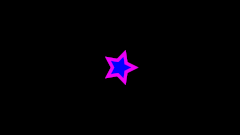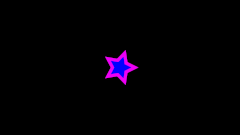Difference between revisions of "Radial Blur Layer"
From Synfig Studio :: Documentation
m (Cleaning and review) |
|||
| (9 intermediate revisions by 3 users not shown) | |||
| Line 2: | Line 2: | ||
{{Title|Radial Blur Layer}} | {{Title|Radial Blur Layer}} | ||
{{Category|Layers}} | {{Category|Layers}} | ||
| + | {{Category|Blurs}} | ||
| + | {{NewTerminology}} | ||
<!-- Page info end --> | <!-- Page info end --> | ||
| − | + | [[File:Layer_blur_blur_icon.png|64px]] | |
== About Radial Blur Layers== | == About Radial Blur Layers== | ||
| − | + | Radial control of the size of the blur. | |
| − | + | ||
==Parameters of Radial Blur Layers== | ==Parameters of Radial Blur Layers== | ||
| − | The parameters of the | + | The parameters of the {{literal|Radial Blur Layer}} are: |
| + | |||
| + | {|{{Parameters}} | ||
| − | |||
| − | |||
| − | |||
|-style="background:#" | |-style="background:#" | ||
||{{l|Image:Type_real_icon.png|16px}} {{l|Z Depth Parameter|Z Depth}} | ||{{l|Image:Type_real_icon.png|16px}} {{l|Z Depth Parameter|Z Depth}} | ||
| Line 34: | Line 34: | ||
|-style="background:#eeeeee" | |-style="background:#eeeeee" | ||
| − | ||{{l|Image:Type_vector_icon.png|16px}} Origin | + | ||{{l|Image:Type_vector_icon.png|16px}} {{l|Origin Parameter|Origin}} |
||0.000000u,0.000000u | ||0.000000u,0.000000u | ||
||vector | ||vector | ||
|-style="background:#" | |-style="background:#" | ||
| − | ||{{l|Image:Type_real_icon.png|16px}} Size | + | ||{{l|Image:Type_real_icon.png|16px}} {{l|Size Parameter|Size}} |
||0.200000 | ||0.200000 | ||
||real | ||real | ||
|-style="background:#eeeeee" | |-style="background:#eeeeee" | ||
| − | ||{{l|Image:Type_bool_icon.png|16px}} Fade Out | + | ||{{l|Image:Type_bool_icon.png|16px}} {{l|Fade Out Parameter|Fade Out}} |
| − | + | || {{Bool|}} | |
| − | + | ||
| − | | | + | |
| − | |} | + | |
||bool | ||bool | ||
| + | |- | ||
|} | |} | ||
| + | |||
| + | == Samples == | ||
| + | If you wonder how the animations were made ([[Media:radial_blur.sifz|sample file]]): | ||
| + | * a {{l|Star Layer}} is positioned at center of the Frame, with an {{l|Outline Layer}} of width 0.05u | ||
| + | * the animations have 120 frames, and the [[#Size|Size]] parameter of the blur goes from 0u,0u to 1u,1u | ||
| + | * the {{l|Render dialog|rendering}} settings are set to Quality 9 and Anti-Aliasing 1 | ||
| + | |||
| + | First sample is without [[#Fade Out|Fade Out]]: | ||
| + | |||
| + | [[Image:radial_blur.gif|Fade Out was enabled]] [[Image:radial_blur_fade_out.gif|Fade Out was enabled]] | ||
| + | |||
| + | == See also == | ||
| + | * A short description of the blur layers can be found here: {{l|Layer}} | ||
| + | * {{l|Blur Layer}} mostly used types of blur. | ||
| + | * {{l|Motion Blur Layer}} a type of blur that aims to simulate a motion blur (the one that happens when the object's movement is too fast for the exposure time). It is controlled by a single parameter called {{Literal|Aperture}}. | ||
Latest revision as of 20:24, 26 April 2020
About Radial Blur Layers
Radial control of the size of the blur.
Parameters of Radial Blur Layers
The parameters of the "Radial Blur Layer" are:
| Name | Value | Type | |
| 0.000000 | real | ||
| 1.000000 | real | ||
| Composite | integer | ||
| 0.000000u,0.000000u | vector | ||
| 0.200000 | real | ||
| |
bool |
Samples
If you wonder how the animations were made (sample file):
- a Star Layer is positioned at center of the Frame, with an Outline Layer of width 0.05u
- the animations have 120 frames, and the Size parameter of the blur goes from 0u,0u to 1u,1u
- the rendering settings are set to Quality 9 and Anti-Aliasing 1
First sample is without Fade Out:
See also
- A short description of the blur layers can be found here: Layer
- Blur Layer mostly used types of blur.
- Motion Blur Layer a type of blur that aims to simulate a motion blur (the one that happens when the object's movement is too fast for the exposure time). It is controlled by a single parameter called "Aperture".


